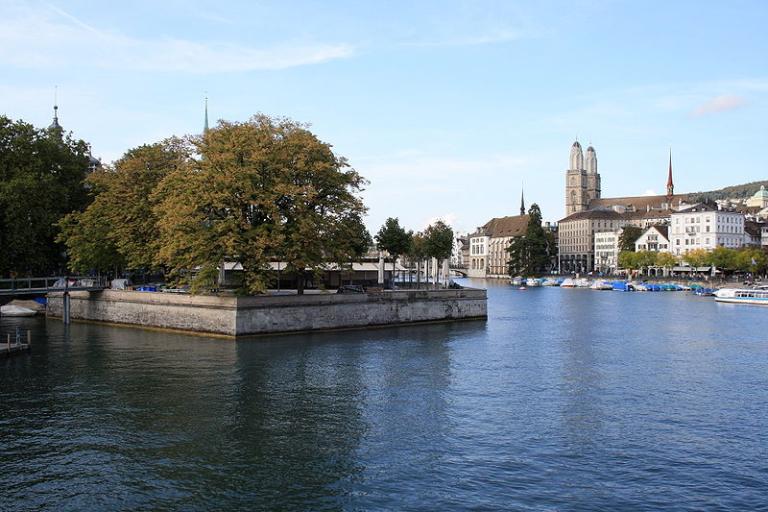
(Wikimedia Commons public domain photo)
Shortly before our departure for Colorado, a good friend — formerly our branch president in Cairo and, upon his retirement from government service in many parts of the world, an Arabic teacher in my department at BYU — brought over a gift that he and his family quite rightly knew that I would love. It bears the title s Nöi Teschtamänt Züritüütsch — “The New Testament in Zürich German [Dialect]” — with the subtitle us em Griechische übersetzt vom Emil Weber. Our friend is married to a German woman (also a friend, of course), and one of his sons currently lives and works in Switzerland. I had once shared with her an Amish Bible, in their peculiar German dialect, that I had bought in Pennsylvania. I love such things. So they bought this wonderful book for me.
There are, I believe, a few German-speaking or German-reading folks who follow this blog, so I’m going to give them a puzzle. A pretty simple one, I think. Can anybody out there identify these five New Testament verses?
Am Aafang hät s es scho ggèè, s Wort. Und s Wort isch bi Gott gsii. Und Gott isch es gsii, s Wort. Daas isch am Aafang bi Gott gsii. Ales isch dur ins woorde, und ooni ins isch au nöd öppis woorde vo dem, wo s git. In im isch Läbe gsii, und s Läbe isch s Liecht vo de Mäntsche gsii. Und s Liecht lüüchtet im Tunkle; und s Tunkli hät s nöd phackt.
***
For something else that I’m working on, I needed a list of what ultimately happened (in their mortal lives, anyway, and according to traditions of varying degrees of strength) to the earliest Christian apostles (apart from Judas). I might as well share it here:
Peter was crucified in AD 66 — at his request, upside down — under the Emperor Nero. As it happens, the apostle Paul (an apostle, but not among the original Twelve) was beheaded that same year, also under Nero and also in Rome.
Andrew is said to have preached within the boundaries of today’s Ukraine and around the Black Sea, as well as in Asia Minor (modern-day Turkey) and in Greece, where he was crucified.
Thomas served as a missionary east of Syria and traditionally even into India, where he was killed by four soldiers with spears.
Philip, it is said, taught in North Africa (in Carthage, within modern Tunisia) and also in Asia Minor, where he was put to death.
Bartholomew is claimed to have taught with Thomas in India, but also to have preached in Armenia, Ethiopia, and southern Arabia. The sources don’t seem to agree on how or where he was martyred, but the leading candidates are being flayed alive and then beheaded, in either Armenia or India.
James, the son of Alpheus, is reported to have preached in Syria, where Josephus says that he was stoned and then clubbed to death. Some traditions have him being crucified in lower Egypt (that is, in the northern part of the country).
Simon Zelotes, or Simon the Zealot, is said to have ministered in Persia and to have been killed when he refused to sacrifice to the sun god.
Matthias, who replaced Judas Iscariot after Judas had betrayed Jesus and committed suicide, is reported to have been burned to death in Syria.
Matthew, traditionally credited as the author of the gospel that bears his name, may have escaped martyrdom. Some sources say so. Others, though, relate that he was stabbed to death in Ethiopia.
John was the leader in the Christian community in Ephesus, in Asia Minor, and was exiled to the island of Patmos during Domitian’s persecution in the mid-nineties AD. An early Latin tradition reports that he was cast into boiling oil at Rome but escaped uninjured. No martyrdom is reported for him.
Finally, while we’re at it, let’s see what happened to the other two gospel writers: (1) According to tradition, Mark the Evangelist was dragged by a rope through the streets of Alexandria, Egypt, in AD 68, until he was dead. (2) Luke the Evangelist apparently lived to a ripe old age in his middle eighties, dying in Boeotia, in Greece.












